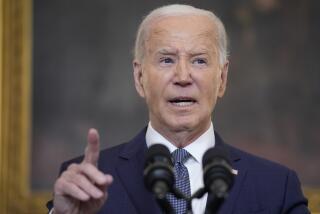Would Compromise on Contras, Reagan Says : He Calls Aid Plan ‘Flexible,’ but Procedural : Ruling May Force Votes on Original Proposal
- Share via
WASHINGTON — President Reagan announced under congressional pressure Thursday that he would accept something less than his original request for military aid to the Nicaraguan rebels, but initial efforts to develop a compromise quickly faltered.
Faced with the clear prospect of defeat when the House and Senate vote on the issue next week, Reagan told an audience at the White House that he is willing to “make some alterations” in his proposed $14-million aid package. “My feet aren’t in concrete on this,” he said. “We’re flexible about the details.”
It was the first time the President had publicly expressed a willingness to compromise, and it prompted GOP congressional leaders to predict that an agreement was at hand. But efforts to work out a substitute agreement soon got tangled in parliamentary difficulties, and it appeared that Reagan would be unable to avoid embarrassing defeats in the House and Senate next week.
Parliamentarians Rule
Parliamentarians in both chambers ruled that Congress could not violate a law passed last year requiring the House and Senate to vote on the President’s request--without amendment--before the issue can be resolved.
In the Democratic-controlled House, Speaker Thomas P. (Tip) O’Neill Jr. (D-Mass.), a staunch opponent of military aid to the contras, as the rebels are known, said the House may not take up any compromise before casting an up-or-down vote on Reagan’s original plan. The President’s request is believed to be at least 30 votes short of victory in the House. The vote is scheduled for Tuesday.
Rep. William S. Broomfield (R-Mich.) accused House Democrats of wanting to vote down the President’s original plan because they “are determined to get the blood of Reagan.”
In the Republican-controlled Senate, advocates of compromise were also unable to find a satisfactory way to avoid a vote on the original request for military aid. As in the House, the vote is scheduled for Tuesday, and it is now considered a tossup.
“The parliamentary situation may make compromise impossible,” said a Senate aide close to the negotiations.
“I am assured that no deal has been reached,” Sen. Mark O. Hatfield (R-Ore.) declared late Thursday afternoon at the beginning of a meeting of the Senate Appropriations Committee. The committee voted 15 to 13 to recommend the President’s original aid request to the full Senate, but even some senators who voted for it said they hope for a compromise by the time the issue reaches the Senate floor.
Congressional leaders of both parties agreed that the White House ultimately will be forced to forgo any military aid, at least for the present. “It is pretty clear that military aid--the $14 million--is dead for a period of time,” said Sen. James A. McClure (R-Ida.)
Under Reagan’s original proposal, the $14 million would be earmarked for humanitarian aid to the rebels for a 60-day period while the Nicaraguan government tried to negotiate a peace settlement with the rightist contras . If the government refused to negotiate, the CIA would be permitted to funnel the money to the rebels as military aid.
Humanitarian Use Only
Republicans and Democrats alike are now advocating that Congress approve funds for humanitarian purposes only. According to House assistant Republican leader Trent Lott of Mississippi, the President has accepted that approach with the stipulation that he could return to Congress later seeking military aid for the contras in fiscal 1986.
After voting on Reagan’s original request next week, the House will vote on separate alternatives offered by the Democrats and the Republicans. The Democratic alternative, which is expected to pass, would provide $5 million in humanitarian aid for Nicaraguan refugees and $9 million for the four Latin American countries known as the Contadora Group--Mexico, Panama, Venezuela and Colombia--that have been attempting to negotiate a peace settlement in Central America. The money would be used to promote the peace process.
A House GOP alternative being offered by Rep. Joseph M. McDade (R-Pa.) was ridiculed by the Democrats because it would continue to allow the aid to be used for non-lethal military purposes such as uniforms, but still funneled through the CIA. “The CIA is not a humanitarian outfit,” a spokesman for O’Neill said.
No Clear Reagan Signal
In the Senate, no specific humanitarian aid proposal has emerged.
Nor was there yet a clear signal from the President that he had embraced a specific compromise. One White House official who declined to be identified said Reagan was “willing to agree to a modest compromise, but he’d rather lose it than compromise a lot.” But another White House official was quoted as saying, in a reference to humanitarian aid: “We can buy that.”
Despite the gloomy prognosis, the Administration’s lobbying drive in favor of the military aid continued unabated. Officials leaked to reporters the information that Soviet military technicians are building a military communications system in northern Nicaragua in the main area of combat, and a new “white paper” was to be released today updating the government’s estimates of Nicaraguan military strength.
Also contributing to this story were Times reporters Norman Kempster, Doyle McManus and Don Shannon.
More to Read
Get the L.A. Times Politics newsletter
Deeply reported insights into legislation, politics and policy from Sacramento, Washington and beyond. In your inbox twice per week.
You may occasionally receive promotional content from the Los Angeles Times.









